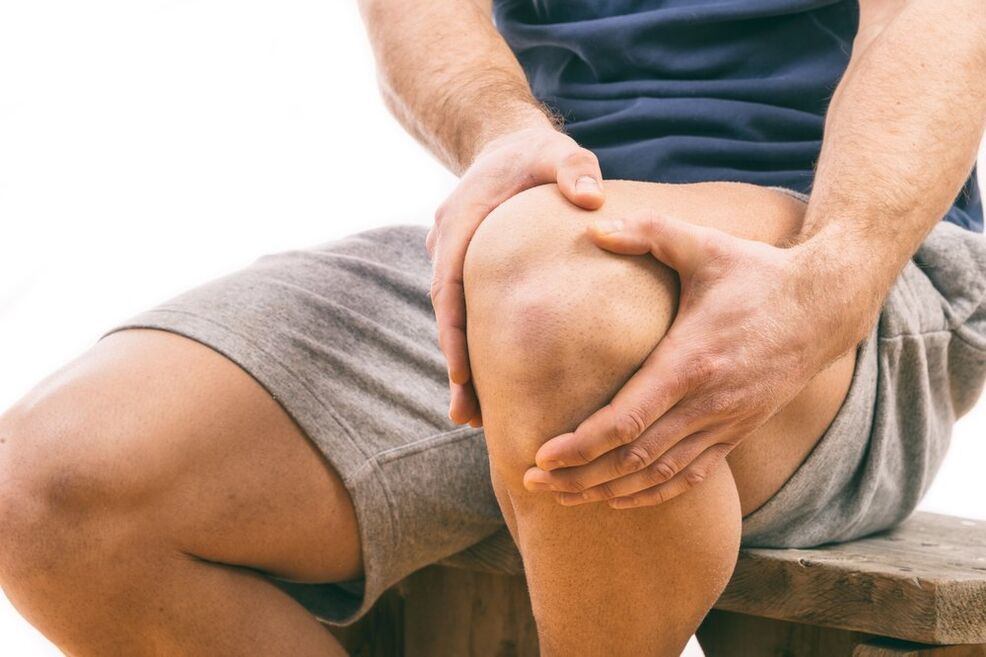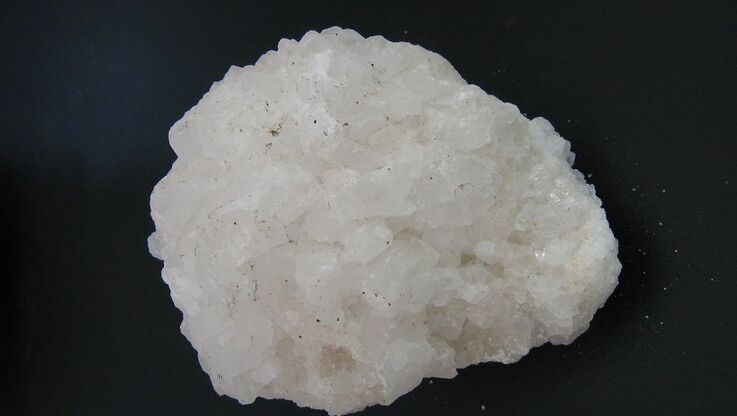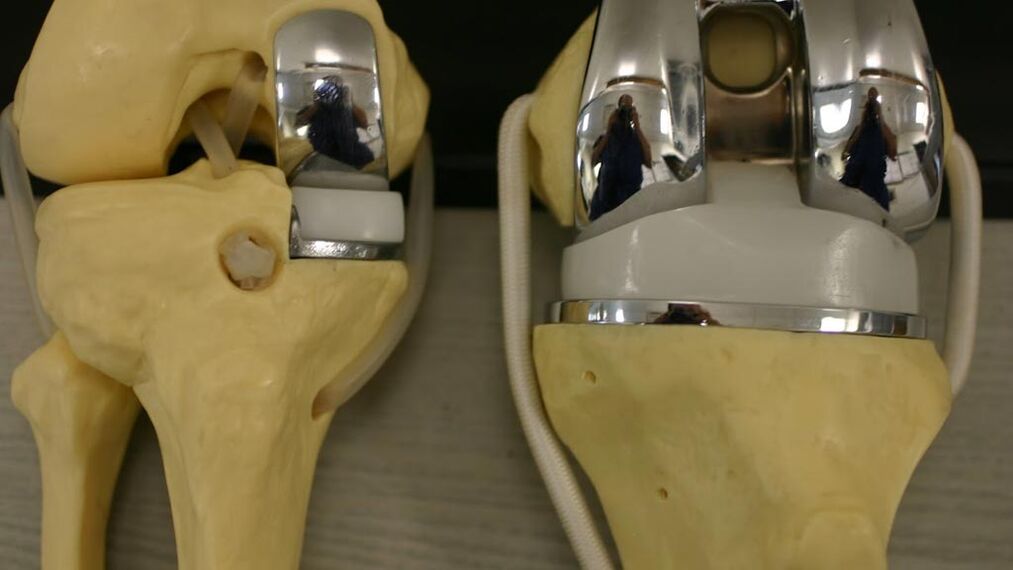Osteoarthritis is a disease of the musculoskeletal system, in which degenerative changes occur in the articular surfaces of the cartilage, gradually the cartilage thins and is destroyed. The main symptoms of the disease are pain and limitation of movement. And due to the pathological proliferation of cartilage and bone tissue, a gradual deformation of the joint occurs, which aggravates the functional limitations.
The knee joint is one of the most common locations for osteoarthritis (osteoarthritis of the knee is also called knee osteoarthritis). Its symptoms appear to varying degrees in nearly 30% of the adult population. Due to the fact that with this disease discomfort during walking develops quite quickly, patients usually consult a doctor in the early stages of the pathology. This fact facilitates the treatment of osteoarthritis of the knee joint and makes it more effective. For therapy, the doctor uses both medical and surgical exposure methods. It is also important to follow your diet, massage, and exercise therapy.
Let's talk in more detail about the methods of treatment.

Drug therapy
Drug treatment of knee osteoarthritis has the following objectives:
- reduction of painful sensations;
- improve the nutrition of articular cartilage;
- normalization of blood and lymphatic microcirculation processes;
- return to previous range of motion.
The drugs can be used at any stage of the disease, but they are only effective enough for minor injuries to the knee.
Chondroprotectors
Chondroprotective drugs are the only group of drugs that work directly on the cause of the disease. The most effective products are those containing glucosamine and chondroitin sulfate.
If you start to treat osteoarthritis of the knee joint with chondroprotectors at an early stage, then it is likely that the treatment will give significant results: it is possible not only to slow down the destruction of cartilage tissue, but also topartially restore it. It is important to note that drugs in this group should be taken in the course for a long time (at least a year). If taken only occasionally, treatment will be unnecessary.
Nonsteroidal anti-inflammatory drugs
Nonsteroidal anti-inflammatory drugs (NSAIDs) have a symptomatic effect in osteoarthritis of the knee: they decrease the severity of inflammation and pain. Thanks to this effect, it becomes possible to use active therapy methods, including physiotherapy exercises and massage, which is important for severe knee injuries. Since these drugs can damage the walls of the stomach, their regular long-term use is not recommended.
To reduce side effects, you can use other dosage forms: suppositories or injections. In this case, it is possible to avoid direct contact of the drug with the gastric mucosa, and the effectiveness of the agent remains high.
Gels or creams containing NSAIDs are relatively ineffective. It was found that only 3% of the active substances penetrate through the surface tissues and reach the intra-articular structures.
Corticosteroid hormones
The use of corticosteroid hormones is advised in cases where it is necessary to temporarily reduce the symptoms of the disease as soon as possible. Usually, injectable forms of drugs are used for intra-articular administration.
Other groups of drugs
An important group of drugs used in the treatment of osteoarthritis of the knee (topical) are vasodilators, which improve microcirculation in the affected area and facilitate lymphatic drainage.
Most often, compresses are used for these purposes, the effectiveness of which is somewhat higher than ointments. Remarkable:
- Dimexide has anti-inflammatory and analgesic effects, improves the properties of blood flow and tissue nutrition. Unlike many similar drugs, it penetrates deep into the tissues.
- Medical bile has a warming and absorbing effect, it is more effective for concomitant inflammatory changes in joint membranes.
- Bischofite is a natural mineral that warms and improves microcirculation in the affected area.
Likewise, for the treatment of osteoarthritis of the knee joint in the initial stages, intra-articular administration of hyaluronic acid has started to be used relatively recently. It is the main component of synovial fluid, therefore, thanks to its use, abrasion of the articular surfaces of cartilage is significantly reduced. When treating knee osteoarthritis it is very important to make sure that this substance does not get into the bloodstream. In this case, the risk of developing embolic complications increases when the drug enters the arteries of internal organs and leads to impaired blood flow. The cost of procedures is quite high.

Elongation
With osteoarthritis, the size of the intra-articular space gradually decreases, due to this, the friction of the joint surfaces against each other increases. As a result, painful sensations increase, and there is a significant limitation in mobility. To increase the distance between the cartilages, in some cases, the use of traction devices (traction) is indicated. Thanks to such procedures, the load on the joint and the severity of symptoms of the disease are reduced. Usually this method is used in courses of 5-7 procedures.
Manual therapy and massage
To treat osteoarthritis of the knee joint, manual therapy and special massage can be used. Their effects are: pain relief, relief of muscle spasms, restoration of range of motion. However, these methods of treatment are effective only in the early stages of the pathology, since with a pronounced deformation of bone and cartilage tissue, it becomes difficult to perform manipulations.
Hirudotherapy
The use of medicinal leeches can be useful in the treatment of knee osteoarthritis: thanks to such procedures, blood properties, local blood flow and tissue nutrition are improved. It is also possible to activate regenerative processes in cartilage tissue and increase the amount of intra-articular fluid.
Physiotherapy
Physiotherapy procedures are generally used as an additional treatment method. Most often, electrophoresis is used: with its help, external drugs penetrate much deeper than with conventional application to the surface of the skin.
You can also use ultrasound, magnetic devices, laser radiation. Thanks to their effect, microcirculation and tissue nutrition improves, the processes of destruction and deformation slow down.
Surgical intervention
Surgical intervention in the treatment of osteoarthritis of the knee is carried out in case of ineffectiveness of conservative methods. Usually in this case the patient has a pronounced deformation of the knee joint and almost complete immobility. During the operation, it is possible to remove the excess tissue that restricts mobility.
In advanced cases, full or partial endoprostheses are performed using titanium structures. The operation is very traumatic, and the duration of the rehabilitation period after it can reach several months. However, a properly performed prosthesis will help restore joint function even in seemingly hopeless cases.

Home treatment
You can treat osteoarthritis of the knee at home, but you must first coordinate all of your actions with your doctor so that you do not injure yourself.
Diet
Adherence to a diet plays an important role in the treatment of knee osteoarthritis, since it is with food that the substances necessary for the renewal of cartilage and bone cells are provided.
In the presence of excess weight, a well-chosen diet will reduce it and therefore reduce the load on the musculoskeletal system.
Physiotherapy
Gymnastic and physiotherapy exercises are an integral part of the treatment of knee osteoarthritis. Thanks to the exercises, the muscles of the thigh and lower leg are strengthened, the mobility of the limb increases, and the condition of the ligaments improves. By improving the blood supply to the affected area, the supply of nutrients and oxygen is increased. It is very important to regularly carry out an individual exercise therapy complex. From time to time it is advisable to work with an instructor - this way you can check the correctness of the exercises and, if necessary, modify them.
Physiotherapy
Physiotherapy can also be used to treat osteoarthritis of the knee joints at home. For this, portable devices for UHF, small magnets, paraffin compresses are used. During procedures it is necessary to achieve maximum muscle relaxation, and during physiotherapy it is desirable to reduce the load on the affected limb. To do this, you can use a cane: by leaning on it, a person reduces the load on the knee by 40%. For the rod to be effective, it is important to choose the right size for it.
Folk ways
There are many popular recipes that can provide tangible benefits in the treatment of osteoarthritis of the knee joint. Here are a few :
- chopped warmed horseradish root should be tied to the knee at night;
- in case of pain, you can drink a glass of onion broth (one liter of boiling water for two onions) three times a day;
- it is recommended to take baths with a decoction of malt and senna herbs several times a week;
- with severe inflammation, you can wipe the knee joint with a lemon wedge or tie a compress of oatmeal.
Conclusion
There is no definitive answer to the question of how to cure osteoarthritis of the knee joint. Most experts believe that the disease is incurable, and with the help of modern methods it is possible only to slow down (stop) the process of destruction of the joints and only partially restore the lost functions. It is therefore important to pay particular attention to prevention and to implement it from an early age.





































